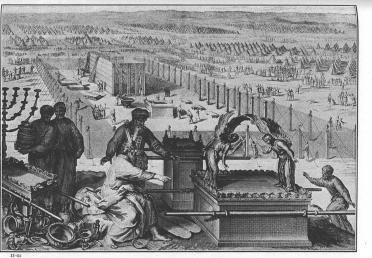Every week, parshaoftheweek.com brings you a rich selection of material on parshat hashavua, the weekly portion traditionally read in synagogues all over the world. Using both classic and contemporary material, we take a look at these portions in a fresh way, relating them to both ancient Jewish concerns as well as cutting-edge modern issues and topics. We also bring you material on the Jewish holidays, as well as insights into life cycle rituals and events...
This week, in Parshat Terumah, we begin the long section of the Torah which discusses the building of the Mishkan, the portable temple which the Israelites used in the desert, prior to arriving in the Land of Israel and the construction of the actual temple in Jerusalem.
I imagine that if you were to ask most people what they associate with the tabernacle or the temple, what comes into their minds when thinking about those places, the sacrifices would be high up on the list. Most of us, when we imagine the temple, imagine animals being slaughtered, the sprinkling of blood, and the burning of flesh. We might also think about barbecues, as the majority of the animals offered in the temple were, in fact, eaten, by the priests and the individuals who offered them.
It is interesting, therefore, to note that the Ramban, when prefacing this week’s parsha, and discussing the point of the tabernacle, does not once mention sacrifices. Instead, he talks about the elements of a relationship: God’s presence in the Mishkan, sensed keenly by the Israelites; the fact that He spoke to Moshe there, as He did on Mt. Sinai, continuing, as the Ramban points out, to teach him Torah; and the notion that this would be, as would the temple, a place from which the Jewish people could pray to God, and seek Him out.
It is only after we have been given the instructions pertaining to the building of the Tabernacle, along with its utensils and furnishings, after we have been taught how to build a dwelling place for God, and the Book of Exodus ends, that the Torah turns to the issue of sacrifices, explained at length in the Book of Leviticus, which follows immediately. It is in his preface to that book that the Ramban explains the place of sacrifices: since the construction of the Tabernacle places us in an intimate, ongoing relationship with God (“And they shall make me a Temple, and I shall dwell among them”), and in such a relationship, mistakes are made, feelings are hurt, and expectations are sometimes not met – in other words, we sin – sacrifices are necessary to make it possible for the partners in this relationship – God and the People of Israel – to make up, say I’m sorry, make some sort of gesture of reconciliation, of apology, and move on.
What the Temple is really about, therefore, is the relationship, the ongoing conversation and interaction we have with God – the Torah we continue to learn from Him, and the prayers we articulate in order to say what we have to say to Him. It is not really about the sacrifices. These are simply a tool, a method to smooth over the difficulties inherent in any real relationship.
One could compare this to the difference between the reality of a day-to-day relationship between a husband and wife, and the special occasions when gifts are exchanged between them. The relationship is really about the daily interchange of ideas, feelings, intimacy, hopes, dreams, successes and disappointments between the two spouses. Once in a while, however, because relationships are difficult, a gift, a special gesture, a sacrifice, is necessary in order to smooth over the rough patches, but these do not constitute the relationship. They are simply ritualized strategies to help the relationship along. The relationship, like that between God and His people, is really about the ongoing conversation, the day-to-day talking, learning, and growing we do with and for one another.
Shabbat Shalom,
Rabbi Shimon Felix



Get inspired by Terumah Divrei Torah from previous years